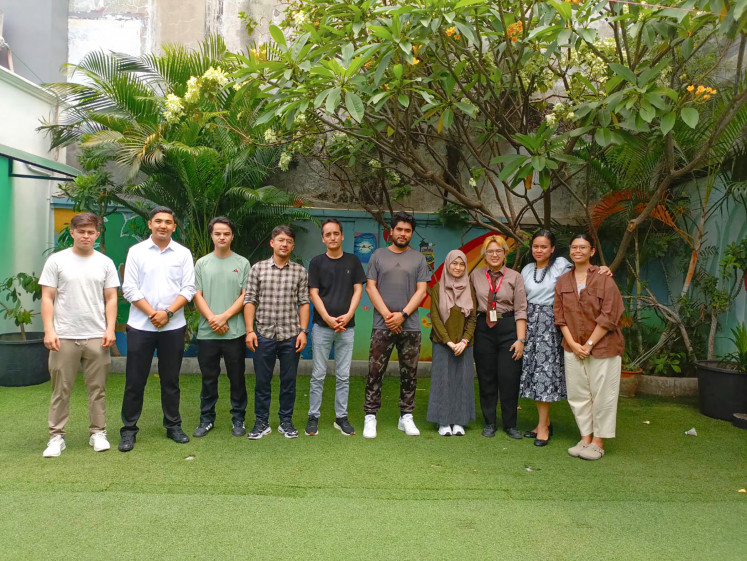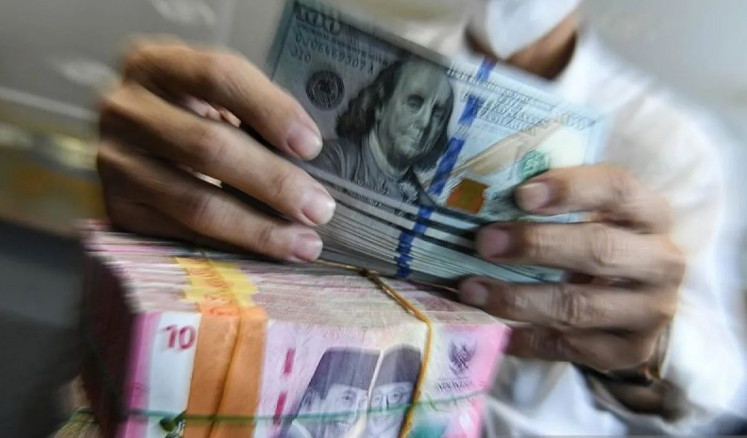Popular Reads
Top Results
Can't find what you're looking for?
View all search resultsPopular Reads
Top Results
Can't find what you're looking for?
View all search resultsIn Papua, working together to prosper
Welcome: Some of the residents, including several children, had painted their bodies black and white with makeup and danced to songs and chants as soon as the guests exited their cars
Change text size
Gift Premium Articles
to Anyone
W
span class="caption">Welcome: Some of the residents, including several children, had painted their bodies black and white with makeup and danced to songs and chants as soon as the guests exited their cars.
In Ogenetan, a tiny village located in Iniyandit, one of the more remote districts of Boven Digoel regency in Papua, residents recently donned their best traditional attire to welcome several guests from Jakarta.
Some, including several children, had painted their bodies black and white with makeup and danced to songs and chants as soon as the guests exited their cars. A group of women also started to dance at the other end, in front of the main building of the kampung, which is located deep in the rainforest near Indonesia's border with Papua New Guinea.
As a group of young men started to play music using guitars and a plastic water drums, girls sashaying in grass skirts invited the guests to pass through.
'This is our way to give guests a warm welcome,' Yan Karowa, the local district head, said. 'The dances and songs show our hospitality to anybody who is willing to come here.' Everybody was happy whenever guests visited the kampung, he said.
Let's get the party started: Nearly every resident of the kampung was on hand at the hall to welcome the visitors.
Ogenetan is inhabited by 57 families comprising 306 people, who rely principally on rubber farming, introduced to Papua in the early 1970s by Christian missionaries, as their main source of income.
Nearly every resident of the kampong was on hand at the hall, which houses the Nonggup Cooperative that they established.
People wanted to watch as the cooperative's representatives stake a deal with PT Montelo, a private company. About one-and-a-half tons of good-quality rubber sheets were bought by the company for about
Rp 15,000 (US$1.33) a kilogram, described as a fair price given current conditions.
Several years ago, the local residents sold their rubber production rights to middlemen for very low prices. Many had been in deep in debt, often to the very people to whom they sold out. Sadly, the residents bartered away their rubber for basic foodstuffs, such as rice or instant noodles.
Living in isolation about 350 kilometers south of Jayapura, those who live in Ogenetan find that economic development comes very slowly.
Basic foodstuffs were previously exorbitantly expensive. Residents had to venture to places such as Tanah Merah, the capital of Boven Digoel, about five hours away. The journey had to be made by foot; the roads were almost impassable.
The hardships drove Yan Karowa and Riswanto from the NGO Wahana Visi Indonesia to establish the Nonggup Cooperative. 'How can local people enjoy the fruits of their labor if they are burdened with huge debts and are unfavorably dependent on middlemen?' Riswanto said.
Processing: The cooperative sold about 1.5 tons of good-quality rubber sheets for about Rp 15,000 (US$1.33) a kilogram, described as a fair price given current conditions.
The local residents were at first reluctant to found a cooperative, due to previous failures, when money collected from the members was misused or taken away. However, through the work of the NGO, local residents became aware of how a well-organized and transparent cooperative could help the
community.
The cooperative was established in 2009 with just 29 people who pitched in Rp 8 million for its operating capital. Through the cooperative, the local residents reached an agreement with PT Montelo to sell the rubber sheets.
Rubber sheets: Rubber cultivation, introduced to Papua in the early 1970s by Christian missionaries, has since become their main source of income.
Realizing that a cooperative could work and generate profits, members of the kampung joined the cooperative in increasing numbers. Currently, more than 130 people from Ogenetan have signed up and representative offices have been opened in the neighboring districts of Mindiptana and Arimop.
'The establishment of the cooperative enables us to easily communicate on the need to improve quality of rubber production from here,' Widia from PT Montelo said.
With total annual turnover of over Rp 300 million, a shop was opened under the supervision of the cooperative, providing affordable basic necessities and other agricultural produce to members. The shop is managed by Maria Wometa.
The mother of six says that business has been so good that she has been able to send one of her kids to study at a university in Merauke.
Bruno Etmop, the head of the cooperative, said that the cooperative booked a net profit of about Rp 23 million in its first year. By the third year, members were able to share a annual dividend of Rp 7 million.
Aloysius Bayub, a cooperative member, said he earned an average of Rp 1.5 million a month from the sheets made from sap from his 1.5-hectare rubber plantation. 'It is enough to support my daily expenses, including paying the tuition fees for my youngest child at elementary school,' said Bayub, the father of three, whose wife has just died due to illnesses.
Rubber sheets: Rubber cultivation, introduced to Papua in the early 1970s by Christian missionaries, has since become their main source of income.
Bruno said that the cooperative's rapid growth could not be separated from the discipline of its members in playing by the established rules. 'Each member of the cooperative who has debts has understood that the debt must be repaid in installments, together with interest.'
The money collected from the members was deposited in a BPR rural bank, whose officers came to Ogenetan once a month.
Backed by skilled assistants with a basic knowledge of management, Bruno said that he was confident that the cooperative could expand even further.
However small, this joint effort has contributed greatly to the local residents. A spirit for advancement has arisen from Papua, one of the most disadvantaged provinces in Indonesia.
' Photos JP/Hyginus Hardoyo















